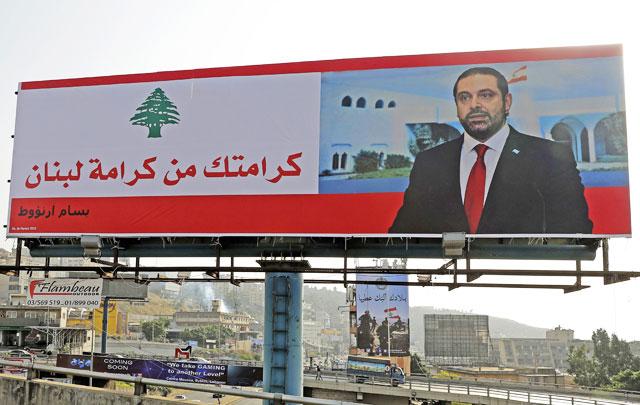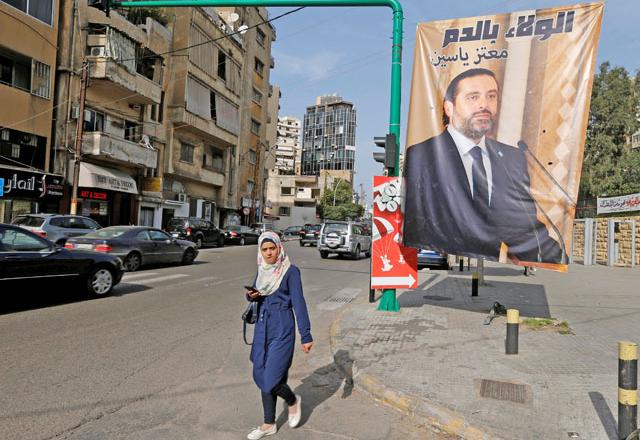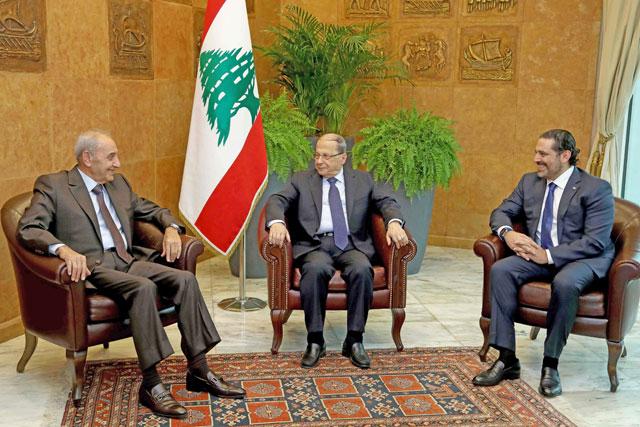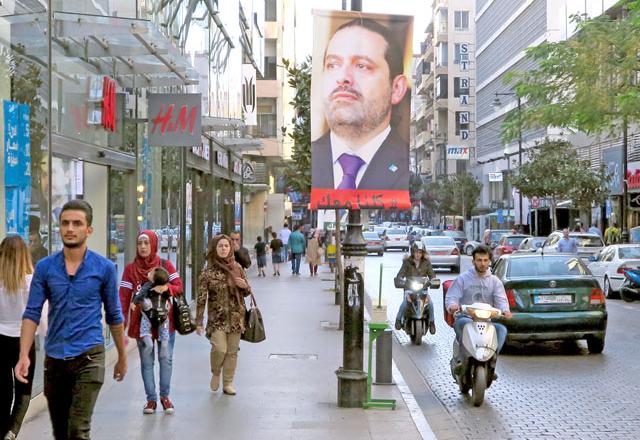You are here
Hariri says to return to Lebanon in next two days
By Reuters - Nov 14,2017 - Last updated at Nov 14,2017

A poster of Lebanese prime minister, Saad Hariri, is seen on a giant billboard that reads in Arabic ‘Your dignity is Lebanon’s dignity’ on the highway of Zouk Mosbeh, north of Beirut, on Tuesday (AFP photo)
BEIRUT — Saad Al Hariri will return to Lebanon from Saudi Arabia within two days, he said on Tuesday, 10 days after his shock resignation as prime minister in a broadcast from Riyadh.
Writing on Twitter, Hariri said he was well and that his family was staying in Saudi Arabia.
His abrupt resignation on November 4 sent Lebanon spinning into political crisis and back onto the frontline of the Middle East power struggle between Saudi Arabia and Iran.
Iran’s ally Hizbollah holds major sway in Lebanese politics. It has long been a foe of Hariri but is part of the coalition government he formed last year and called for his return.
In his resignation he made bitter attacks on both Iran and Hizbollah, and top Lebanese officials and politicians close to Hariri have said Saudi Arabia coerced him to resign, dictated his statement and have held him under house arrest.
Riyadh and Hariri have both denied that. Hariri is a political ally of Riyadh and holds Saudi nationality. He cited a fear of assassination and Hizbollah’s “sowing strife” in the Arab world as his reasons for stepping down.
Riyadh and Hariri both oppose Hizbollah’s military role in Syria, fighting alongside President Bashar Al Assad, and what they allege is its participation in Yemen’s civil war alongside the Houthi group against a Saudi-led coalition.
Hizbollah denies having a role in the Yemeni conflict.
Lebanese President Michel Aoun has said he will not accept Hariri’s resignation until he returns to Beirut to formally submit it. Analysts say that when Hariri does so, members of parliament will nominate him to serve as prime minister once again, and Aoun will ask him to form a new government.
That would open the door to a long period of political talks like those which preceded the formation of the national unity government that made Hariri prime minister a year ago.
Hariri is expected to call on Aoun to convene high-political dialogue on key issues facing Lebanon, chiefly on reaffirming the tiny country’s policy of staying out of regional conflicts and Hizbollah’s role in conflicts outside Lebanon’s borders, senior political sources say.
Any attempt to keep Hizbollah out of the government, in line with Saudi wishes, will torpedo the talks, political sources say. Riyadh regards Hizbollah as a terrorist group.
Warnings
Hariri warned on Sunday in his first interview since resigning of possible Gulf Arab sanctions against Lebanon and of the livelihoods of the 300,000-400,000 Lebanese in the Gulf.
After Hariri’s resignation, Saudi Arabia accused the Lebanese government of declaring war on it because of Hizbollah’s pivotal role in Lebanese politics.
However, Riyadh’s Western allies have struck a tone different from Saudi Arabia, appearing to throw their weight behind both Hariri and the Lebanese state, whose army is a major recipient of US aid.
Sources across Lebanon’s political divide have said Hariri struck a more compromising tone in his interview than in his resignation statement, at one point holding out the possibility of rescinding his decision to quit.
They say this represents a retreat by Saudi Arabia, attributing it to Western pressure.
The Maronite Patriarch Bechara Boutros Al Rai, head of Lebanon’s biggest Christian community, met Hariri and Saudi King Salman and Crown Prince Mohammed in Riyadh on Tuesday.
Al Arabiya News Channel quoted him as saying he supported the reasons for Hariri’s resignation. His comments reflect the views of some politicians in Lebanon’s divided Maronite community but not President Aoun.
Echoing Saudi demands, MPs from Hariri’s Future Movement called for a UN resolution from 2006 that demanded all militias in Lebanon disarm to be respected.
Hizbollah is the only Lebanese group with a militia, and says it needs weapons to secure Lebanon from Israel.
Hizbollah’s Lebanese opponents have long demanded it disarm.
Lebanese politicians have previously held talks on Hizbollah’s arsenal as part of a dialogue on a national defence strategy, but have never seriously discussed disarming it.
Related Articles
BEIRUT — Lebanese President Michel Aoun, who has refused to accept Saad Hariri's resignation as prime minister unless Hariri returns from Sa
BEIRUT — President Michel Aoun held talks on Monday with other Lebanese political leaders over the future of Prime Minister Saad Al Hariri’s
BEIRUT — Lebanon's president on Wednesday accused Saudi Arabia of holding hostage Prime Minister Saad Al Hariri along with his family — the

















